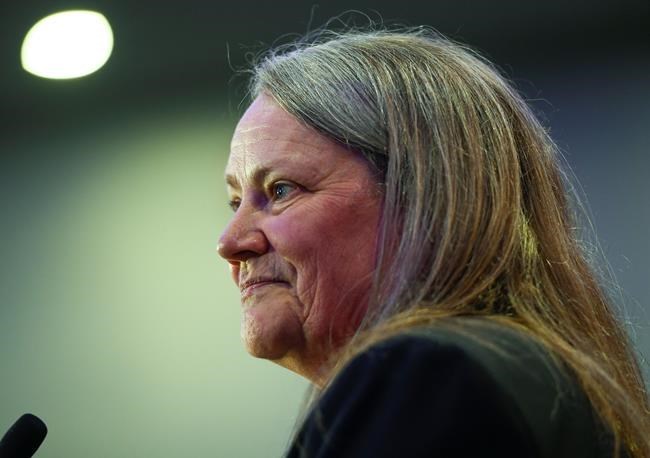
Kimberly Murray speaks after being appointed as Independent Special Interlocutor for Missing Children and Unmarked Graves and Burial Sites associated with Indian Residential Schools, at a news conference in Ottawa, Wednesday, June 8, 2022. THE CANADIAN PRESS/Justin Tang
Republished November 30, 2022 - 4:44 PM
Original Publication Date November 30, 2022 - 3:06 PM
WINNIPEG - On a clear summer day in August, Rebecca Blake found herself standing in a cemetery outside Edmonton searching for the graves of Inuvialuit who died in the South during a tuberculosis epidemic.
In a corner of a cemetery in St. Albert, Alta., under some trees she found a section dedicated to Indigenous peoples and a monument holding the names of 98 people buried there from Northern Canada.
As Blake looked around the area she discovered a grim reality.
"I realized there was not enough room for 98 people. Then I learned they were one upon the other, upon the other," she said.
At a different cemetery, Blake learned a woman who was taken from her community to attend a tuberculosis hospital was buried in the same grave as a local social service recipient.
Blake, who is Inuvialuit and an ordained deacon, was part of a group that included family members and the Inuvialuit Regional Corporation who travelled to the Edmonton area last summer to conduct ceremonies at the burial sites of 12 individuals who were located and identified through the Nanilavut Project. The project, which translates to "let's find them" in Inuktut, began to search for and honour the lives of those who died in TB hospitals.
Blake helped lead the funeral ceremonies. She shared her experience this week at the second National Gathering on Unmarked Burials that was hosted by the office of the independent special interlocutor for missing children and unmarked burials and the National Centre for Truth and Reconciliation.
"The sense of reuniting was indescribable. Everything that I witnessed over those few days will stay with me for the rest of my life and has changed me," Blake told a crowd of residential school survivors, health experts and family members.
The event, which wrapped Wednesday, focused on promoting community well-being and addressing trauma in the search and recovery of missing children.
Kimberly Murray, whom the federal government named as the special interlocutor in June, identified common concerns when addressing trauma.
Murray said communities are in urgent need of resources to implement wellness programs. She said Indigenous elders and healers need to be recognized as mental health practitioners and changes are needed to federal funding agreements.
The federal government plans to spend $320 million to help Indigenous communities heal from the ongoing effects of residential schools through projects, including searching former school sites, holding ceremonies or memorializing sites.
Murray said communities have been told this funding cannot be used for legal assistance.
"When I think about the history of the Indian Act and how Indigenous people weren't allowed to hire lawyers, it's almost like they took that provision of the Indian Act and breathed life back into it in their terms and conditions of their funding agreements."
Some communities have expressed difficulty accessing lands and negotiating with private landowners, which has forced them to search for legal assistance, said Murray.
Sioux Valley Dakota Nation in western Manitoba was recently denied access to search for unmarked graves on part of the grounds of the former Brandon Residential School. The area is now a private campground.
Murray submitted a progress report to the federal government at the beginning of this month that outlined other common concerns she has heard.
They include the barriers survivors and communities face when requesting access to records. In one case a survivor was told it would take six months for them to gain access, said Murray.
She also found there are questions about whether law reform and other measures are needed to support death investigations and, where appropriate, criminal prosecutions.
Murray called for governments to immediately waive their fees for communities to be able to access death, birth or any other certificates that the statistics offices hold.
"We've heard at this gathering there are family members buried in cemeteries in marked graves, but they don't know where they are," she said. "Those death records can tell them where they're buried … communities need to have access to that."
When families lose a child without any answers to what happened or where they are buried, it leads to a different kind of unresolved grief, former senator and judge Murray Sinclair said during his keynote speech Monday evening.
"Trauma that we all feel as a collective of the effects that children are still in the ground and were so badly treated is a trauma that runs throughout our nations in all of us," Sinclair said.
Murray said she also heard this week about the importance of community solidarity when it comes to recovery work.
"People are helping each other in the healing, and there's power to that."
The Indian Residential Schools Resolution Health Support Program has a hotline to help residential school survivors and their relatives suffering from trauma invoked by the recall of past abuse. The number is 1-866-925-4419.
This report by The Canadian Press was first published Nov. 30, 2022.
News from © The Canadian Press, 2022